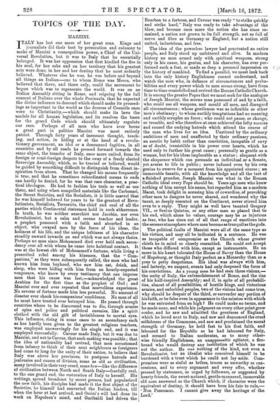TOPICS OF THE DAY.
MAZZINI. Bourbon to a fortress, and Cavour was ready " to strike quickly and strike hard," Italy was ready to take advantage of the blow, and become once more the nation she has since re- mained, a nation not grown to its full strength, not so full of nerve and fibre as Germany or England, but a nation still united, industrious, and free.
The idea of the powerless lawyer had penetrated an entire people, and Italy stood up unfettered and alive. In modem history no man armed only with spiritual weapons, strong only in his cause, his genius, and his character, has ever per- formed such a feat, or made so deep a personal impression on the history of mankind. To find a parallel, we must look back into the only history Englishmen cannot understand, and watch the men who, in defiance of circumstances and proba- bilities and every power which to men seems strong, have from time to time remodelled and revived the Roman CatholicChurch. It is among the greater Popes that we must seek for the analogue of Joseph Mazzini, the serene man possessed of and by a faith, who could use all weapons, and mould all men, and disregard all circumstances ; whose gentleness was as inflexible as other men's obstinacy; to whom earthly temptations had no meaning and earthly scruples no force ; who could not pause, or change, or tremble, and who therefore at once achieved the lofty success and roused the undying hatreds which attend the course of the man who lives for an idea. Unstirred by the ordinary ambitions of men and unaffected by their ordinary passions, an ascetic by habit rather than conviction, incapable of envy as of doubt, irresistible in his power over hearts, which he used only to further his great cause ; personally as gentle as a woman, but for his ideas implacable as a statue ; eloquent with the eloquence which can persuade an individual or a Senate,. yet averse to life in public ; never induced even by his own genius to swerve for a moment from his appointed course ; an immovable fanatic, with all the knowledge and all the tact of a finished grandee, Joseph Mazzini was what in the Roman Catholic ideal every Pope should be. Years ago men who knew nothing of him except his name, but regarded him as a modern Marat, took delight in accusing him of cowardice, of provoking other men to dangers he never shared, and wondered why the taunt, so deeply resented on the Continent, never stirred him even to a reply. They might as well have taunted Gregory VII., or Sextus Quintus, or any other man so placed that to his end, which alone he values, courage may be as injurious as fear, who has risen out of all that range of emotions into the sereneratmosphere where men become as tranquil as the gods.
The political faults of Mazzini were all of the same type as his virtues, and may all be indicated in a sentence. He was as incapable of compromise as the Church whose greater chiefs he in mind so closely resembled. He could not accept those who differed with him, except as instruments. He no more in his heart tolerated the House of Savoy than the House of Hapsburg, or thought Italy perfect as a Monarchy than as a prey to petty despotisms. His ideal was always with him, and latterly, we suspect, events had only deepened the force of his convictions. As a young man he had seen three visions,— the unity of Italy, the enfranchisement of Rome, and the rise of his balf-inspired Assembly; and if, in spite of all probabili- ties, almost of all possibilities, of hostile kings, and victorious armies, and enfeebled peoples, two of the visions had come true, why should he despair of the third, or surrender any portion of his faith, or be false even in appearance to the mission with which he was entrusted from on high I He could make no terms, and he made none, and while his judgment on every other point grew cooler, and he saw and admitted the greatness of England, which he loved next to Italy, and saw and denounced the cruel selfishness of the Commune, and saw and proclaimed the moral strength of Germany, he held fast to his first faith, and laboured for the Republic as he had laboured for Italy, and seemed to Italian moderates, as to many other- wise friendly Englishmen, an unappeasable agitator, a fire- brand who would destroy any institution of which he was not the author. He V7 OA nothing of the kind, not even a Revolutionist, but an idealist who conceived himself to be burdened with a trust which he could not lay aside. Com- promises were as sinful as bribes, truces as unworthy as con- cessions, and to every argument and every offer, whether pressed by statesmen, or urged by followers, or suggested by hearty friends, the sweet-natured, gentle-mannered, immovable old man answered as the Church which, if character were the equivalent of destiny, it should have been his fate to rule,- ' Non Possumus. I cannot give away the heritage of the Lord.'


































 Previous page
Previous page